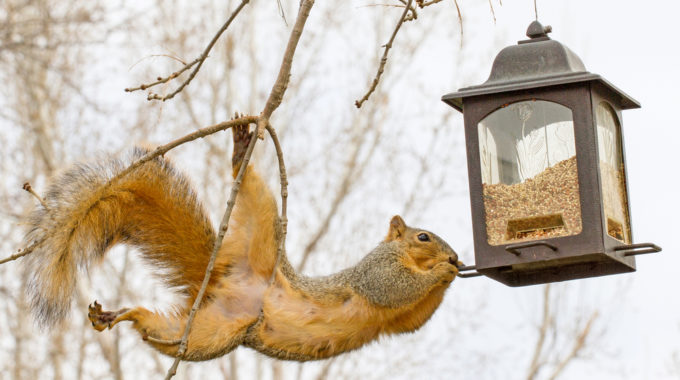
Go Nuts! Think Like a Squirrel
Generally, I try not to generalize. But this morning when I slid open the door to the “flight deck” and watched yet another Cirque du Squirreleil act (leaping from an upside-down position on a slick, tubular, suspended bird feeder 10 feet over concrete to leap onto the deck in a fraction of a second), I generalized.
It was brilliantly executed, but I suddenly realized that far more brilliant was the fact that the squirrel had solved the problem of getting to this well-protected (I thought) feeder — and to every other bird feeder we have ever put up.
Think about it: birds can fly, so how hard can it be to set up a situation in which the birds — wings and all — can get to the seeds, and squirrels (wingless beasts, last I checked, even the “flying” kind) are left watching helplessly? And yet there is a whole product category of squirrel-proof feeders. Check it out: Google has about 211,000 results for “squirrel proof bird feeder” — in quotes!
How could this be? I think I know, from many hours of watching with admiration to the point where I have a little picture book floating in my head titled, Think Like a Squirrel: The Relentless Rodent’s Guide to Problem Solving.
Recently (11/2/2022), Jeb Blount was on Market Dominance Guys and the topic of squirrels came up because of his favorite chapter in his new book, Selling in a Crisis: 55 Ways to Stay Motivated and Increase Sales in Volatile Times. You can listen to this episode here:
Back to the squirrels.
In their pursuit of that next cheek-pouch full of calories, squirrels do five things we, as salespeople, should emulate in business and in life:
- They don’t give up. I have myself given up counting the number of times we declared victory for us and the birds and defeat for the squirrels (“Go find your own food!”), only to get up the next morning to be greeted by an empty feeder, or a feeder lying empty on the ground, sometimes shattered, sometimes merely disassembled. The squirrels kept trying, and trying, and trying — and eventually they cracked that feeder’s code, or smashed the feeder itself. And when they fall, they get up and give it another go.
- They give it their all. When a squirrel climbs a skinny steel pole, no amount of backsliding keeps it from gripping tighter and pushing harder. Squirrels don’t turn to their colleagues to bitch and moan about how the pole is too slick, or the climb too high, or the leap too far. They do it like their lives depend on getting to those seeds.
- They don’t get fixated on one idea. A squirrel will try something a few times, all out. But once it’s clear that’s not going to work, they change it up. Squirrels know that their first idea might not be the one that works. They try different approaches until one of them works. The solution might involve a climb in the wrong direction to get to a back-to-the-ground high wire from which to leap and catch a perch with a hind foot, leading to a heads-down dangle for dining. So what? Let’s try it!
- They repeat what works. Once a solution is found, creativity is for the birds, not the squirrels. That feeder, or what’s in it, is going down, my friend. Repeatedly. Until proven otherwise. You don’t hear squirrels whining, “This script doesn’t let me exercise my famous problem-solving skills.” They repeat, and they eat.
- They copy what works. Once one squirrel solves a feeder, it’s a free-for-all. There is no pride of authorship in Squirrelville. Squirrel see, squirrel do. As simple as that.
Are the problems we face as salespeople, as businesspeople, as human beings, so much more difficult that we should dismiss squirrels as “stupid rodents” and adopt a more sophisticated approach? Perhaps one that involves a lot of meetings and discussions, or in which we focus on the next problem after that other problem beyond the one right in front of us? Or perhaps we should give a half-try or two, declare it to be just too much, and demand some relief (and a base salary!) for our “efforts”? Or should we let pride be our guide and refuse to do what has worked for others, because it’s not entertaining enough for us?
We can adopt any of these popular approaches and throw in a little envious chatter about how it’s just not fair that that other lucky animal got a nuttier territory than ours when they’re headed to Top Squirrels’ Club and we’re left behind with the not-quite-good-enoughs. Or we can think, and do, like a squirrel, take matters into our own little paws, and leave no feeder unturned.
Since the dinosaurs departed, relentless rodents have had a pretty good run. My advice: go nuts and think, and act, a little more like a squirrel, today and every day.
